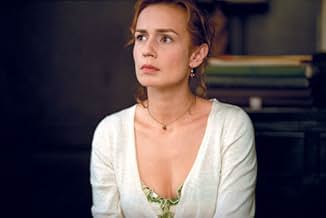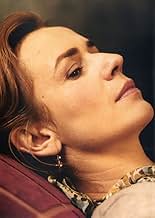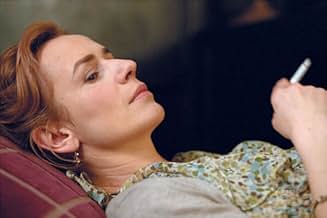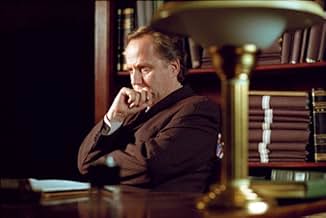IMDb RATING
6.9/10
5.4K
YOUR RATING
A Frenchwoman tells her marital troubles to a man she mistakes for a psychiatrist, and soon they form an unusual relationship.A Frenchwoman tells her marital troubles to a man she mistakes for a psychiatrist, and soon they form an unusual relationship.A Frenchwoman tells her marital troubles to a man she mistakes for a psychiatrist, and soon they form an unusual relationship.
- Awards
- 3 nominations total
Véronique Kapoyan
- Female Guard
- (as Véronique Kapoian)
Albert Simono
- Mr. Michel
- (as Alberto Simono)
Featured reviews
7=G=
In "Intimate Strangers", a beautiful woman wanders into the office of a meek and unassuming tax consultant mistaking it for a psychiatrist's office. When the tax man realizes the error, the woman has already engaged him and wishes to continue their sessions. This relatively uneventful and mostly conversational drama is all about the symbiotic relationship which follows from the chance encounter and how it changes the lives of the pair of protagonists. The film features finely nuanced performances and penetrating insights into the relationship and little more. Don't expect any extremes of emotion, sex, nudity, or other titillaters as it's all about the interpersonal relationship; no more, no less. Excellent for what it is, "Intimate Strangers" will appeal most to mature audiences into French people flicks. (B)
Anna (Sandrine Bonnaire) has an appointment with her analyst, doctor Monnier (Michel Duchaussoy) to tell him her sentimental problems. But because of a little talky concierge and dimly lit, somewhat eerie corridors, she lands in William Faber's office (Fabrice Lucchini) who is a financial adviser. Expect the unexpected at least for a short time. Rather than telling her that he's not the right man to talk to, he listens to her very carefully and sets up a second appointment with her. The following week, he reveals her the truth but agrees to see her as many times as she wants to. Anna accepts his offer and these two idiosyncratic characters strike up an ambiguous relationship which will partly unveil their respective personalities, at least for William.
"Confidences Trop Intimes" is the successor of a peak in Patrice Leconte's eclectic filmography, "l'Homme Du Train" (2002) and if it doesn't exactly match the greatness of this film, it nonetheless remains a true winner which encompasses everything that makes Patrice Leconte a worthwhile filmmaker. First with this original starting point: a woman who was badly directed in a building winds up in an office belonging to a character who is a total stranger to her. But as doctor Monnier says: "there isn't a big difference between a shrink and a financial adviser: they have to define and solve their customers' problems. The difference is that to a financial adviser's his problems are bare while to an analyst's they're hidden".
Ambiguity is one of the key words to describe the relationships between William and Anna. Is Anna really in bad terms with her eccentric husband (stout Gilbert Melki)? Doesn't she try to manipulate her partner? Isn't she a little crazy? They're exciting questions that call upon the viewer's imagination. As for William, one realizes that the sort of therapy that links the two characters is mainly destined to him. He's probably THE main character of the whole film. At first, he seems strong but bit by bit he proves that he's a fragile character who yearns to change his life. His unexpected meeting with Anna gives him this opportunity and makes him elated for a while (see the delightful sequence when he dances to "in the Midnight Hour" by Wilson Pickett). But then his real personality appears: he's a rather vulnerable man who has trouble with women and perhaps that's why his wedding with his former wife (Anne Brochet) went unravel. Besides she tells him that he didn't make the first move to meet her.
Leconte is well served by his duo of actors and it's a real surprise to discover and appreciate Fabrice Lucchini in an introverted man whereas he is usually typecast in extrovert roles. Sandrine Bonnaire makes an ideal partner. One should also hail the filmmaker for having discerningly chosen the scenery of this idiosyncratic in camera. Dimly lit corridors and rooms are deftly incorporated to the plot and give a sultry sensation to the ambiguous relationship between William and Anne, a strong point that was tapped fifteen years ago in "Monsieur Hire" (1989) when Michel Blanc was alone in his cramped flat. Sandrine Bonnaire was then her partner. So, when the camera goes out into the open air, the interest depletes a little in spite of good moments. While I'm writing about this shortcoming, I could also regret a misunderstanding too quickly solved (the second time when William and Anna meet again, he tells her that he's not the right person) and mention a too much cozy end.
But overall, when you have a strongly built story which has a lot of space for surprises and the development of its characters and a lot of food for thought, you can skip without problems conspicuous faults and leave the projection with a big smile on your face. Once again Leconte filled me with joy. Recommended to his aficionados.
NB: the film was turned into a play three years later.
"Confidences Trop Intimes" is the successor of a peak in Patrice Leconte's eclectic filmography, "l'Homme Du Train" (2002) and if it doesn't exactly match the greatness of this film, it nonetheless remains a true winner which encompasses everything that makes Patrice Leconte a worthwhile filmmaker. First with this original starting point: a woman who was badly directed in a building winds up in an office belonging to a character who is a total stranger to her. But as doctor Monnier says: "there isn't a big difference between a shrink and a financial adviser: they have to define and solve their customers' problems. The difference is that to a financial adviser's his problems are bare while to an analyst's they're hidden".
Ambiguity is one of the key words to describe the relationships between William and Anna. Is Anna really in bad terms with her eccentric husband (stout Gilbert Melki)? Doesn't she try to manipulate her partner? Isn't she a little crazy? They're exciting questions that call upon the viewer's imagination. As for William, one realizes that the sort of therapy that links the two characters is mainly destined to him. He's probably THE main character of the whole film. At first, he seems strong but bit by bit he proves that he's a fragile character who yearns to change his life. His unexpected meeting with Anna gives him this opportunity and makes him elated for a while (see the delightful sequence when he dances to "in the Midnight Hour" by Wilson Pickett). But then his real personality appears: he's a rather vulnerable man who has trouble with women and perhaps that's why his wedding with his former wife (Anne Brochet) went unravel. Besides she tells him that he didn't make the first move to meet her.
Leconte is well served by his duo of actors and it's a real surprise to discover and appreciate Fabrice Lucchini in an introverted man whereas he is usually typecast in extrovert roles. Sandrine Bonnaire makes an ideal partner. One should also hail the filmmaker for having discerningly chosen the scenery of this idiosyncratic in camera. Dimly lit corridors and rooms are deftly incorporated to the plot and give a sultry sensation to the ambiguous relationship between William and Anne, a strong point that was tapped fifteen years ago in "Monsieur Hire" (1989) when Michel Blanc was alone in his cramped flat. Sandrine Bonnaire was then her partner. So, when the camera goes out into the open air, the interest depletes a little in spite of good moments. While I'm writing about this shortcoming, I could also regret a misunderstanding too quickly solved (the second time when William and Anna meet again, he tells her that he's not the right person) and mention a too much cozy end.
But overall, when you have a strongly built story which has a lot of space for surprises and the development of its characters and a lot of food for thought, you can skip without problems conspicuous faults and leave the projection with a big smile on your face. Once again Leconte filled me with joy. Recommended to his aficionados.
NB: the film was turned into a play three years later.
The gimmick in "Intimate Strangers" is that a young woman, Anna Delambre (Sandrine Bonnaire), mistakenly enters the office of a tax consultant, William Faber (Fabrice Luchini), instead of a psychoanalyst, and tells him her most intimate secrets. The question then arises: Did she make an honest mistake, or is the whole thing a setup? Which of the two is the doctor, and which is the patient? Is she telling the truth, or is she a pathological liar? And why does he maintain the illusion instead of calling her bluff?
"Intimate Strangers" works well as a psychological thriller, an elaborate cat-and-mouse game. But it is also a meditation on loneliness and the lengths to which we are willing to go to overcome it ... or not. In other words, do we allow ourselves to be intimate with each other, or do we remain strangers walled in our fortresses of solitude?
Fabrice Luchini's character epitomizes the latter type of person. He leads a solitary and uneventful life, is obsessive-compulsively neat (he uses shoe trees, for heaven's sake), is unable to keep his on-and-off girlfriend happy, and voyeuristically observes the quiet joys and turbulent passions of his neighbors across the way. (Shades of "Rear Window".) Other minor characters exhibit similar tics: his secretary admits to watching rubbish on television while gorging herself on potato chips, and the doorkeeper of the office building spends all her time watching an idiotic soap opera.
Sandrine Bonnaire is, as always, a lovely, delicate vision. She succeeds in conveying the mystery and intrigue of her character, and yet makes Anna wholly believable.
Unfortunately, Fabrice Luchini does not lend the same degree of realism and reality to William. He is too stereotypically anal-retentive and full of hangups, and we never see William as more than two-dimensional. He remains basically the same, unchanged, even by the closing credits. In short, we never get to know him intimately. He begins and ends the film as simply strange.
"Intimate Strangers" works well as a psychological thriller, an elaborate cat-and-mouse game. But it is also a meditation on loneliness and the lengths to which we are willing to go to overcome it ... or not. In other words, do we allow ourselves to be intimate with each other, or do we remain strangers walled in our fortresses of solitude?
Fabrice Luchini's character epitomizes the latter type of person. He leads a solitary and uneventful life, is obsessive-compulsively neat (he uses shoe trees, for heaven's sake), is unable to keep his on-and-off girlfriend happy, and voyeuristically observes the quiet joys and turbulent passions of his neighbors across the way. (Shades of "Rear Window".) Other minor characters exhibit similar tics: his secretary admits to watching rubbish on television while gorging herself on potato chips, and the doorkeeper of the office building spends all her time watching an idiotic soap opera.
Sandrine Bonnaire is, as always, a lovely, delicate vision. She succeeds in conveying the mystery and intrigue of her character, and yet makes Anna wholly believable.
Unfortunately, Fabrice Luchini does not lend the same degree of realism and reality to William. He is too stereotypically anal-retentive and full of hangups, and we never see William as more than two-dimensional. He remains basically the same, unchanged, even by the closing credits. In short, we never get to know him intimately. He begins and ends the film as simply strange.
This is a very clever film with a lot to say about life, death, sex, human relationships, human fragility and loneliness - but it does it all with a wonderfully light hearted touch. Luchini dancing just has to be one of the best scenes - eat your heart out Hugh Grant!! Bonnaire is quite wonderful as Anne, literally blossoming before our eyes, her hair lightening, her skin glowing, her dress changing, becoming lighter and brighter. It seems her accidental psychiatrist does help her. Of course, we never know the full truth - can we believe everything she says - and the device of the windows, so key to the film's turning point, is Hitchcockian in the extreme - vision as deception. The most wonderful insight of this film, though, is that paying taxes and dealing with deep disturbing psychological issues have similar concerns - what do you declare and what do you try desperately to hide? And of course, both actions are undertaken in the name of individuals integrating themselves into society. Another excellent film from Leconte. Just because it is so polished and masterful story telling doesn't mean that it doesn't address other issues that a director such as Rohmer would tackle.
A woman with marriage problems mistakes a financial adviser for a psychiatrist. She tells him all the secrets of her life, whereas the man has not the strength to tell he's not the person she needs to talk to...
"Confidences trop intimes" is a brilliant film directed by Patrice Leconte, with two big French actors -Fabrice Luchini and Sandrine Bonnaire. The film is an intimate comedy, action is made by good dialogs. There's no boredom at all.
It's an interesting movie which shows a strange relationship growing -maybe the woman understands, later, that she has not found the right person. But she's lonely and needs to talk, at the same time the financial adviser is another lonely person who needs someone who catches him out of a boring life. They have nothing in common, but they are made for each other.
The film has a strong screenplay and is supported by the two leading actors -the scenes are almost always between them. The two characters are very deep, the intensity of their words and of their expression doesn't make you feel that the picture misses something. Because everything it's here. The film is able to picture a situation of everyday life, without developing a foreseen love story... Will the two live a real love relationship? We don't know exactly, there's the same ambiguousness which often dominate the relation between a man and a woman...
A very good movie.
"Confidences trop intimes" is a brilliant film directed by Patrice Leconte, with two big French actors -Fabrice Luchini and Sandrine Bonnaire. The film is an intimate comedy, action is made by good dialogs. There's no boredom at all.
It's an interesting movie which shows a strange relationship growing -maybe the woman understands, later, that she has not found the right person. But she's lonely and needs to talk, at the same time the financial adviser is another lonely person who needs someone who catches him out of a boring life. They have nothing in common, but they are made for each other.
The film has a strong screenplay and is supported by the two leading actors -the scenes are almost always between them. The two characters are very deep, the intensity of their words and of their expression doesn't make you feel that the picture misses something. Because everything it's here. The film is able to picture a situation of everyday life, without developing a foreseen love story... Will the two live a real love relationship? We don't know exactly, there's the same ambiguousness which often dominate the relation between a man and a woman...
A very good movie.
Did you know
- ConnectionsFeatures Le concept subtil (1981)
- How long is Intimate Strangers?Powered by Alexa
Details
Box office
- Gross US & Canada
- $2,110,589
- Opening weekend US & Canada
- $55,836
- Aug 1, 2004
- Gross worldwide
- $10,485,817
- Runtime
- 1h 44m(104 min)
- Color
- Sound mix
- Aspect ratio
- 2.35 : 1
Contribute to this page
Suggest an edit or add missing content




































